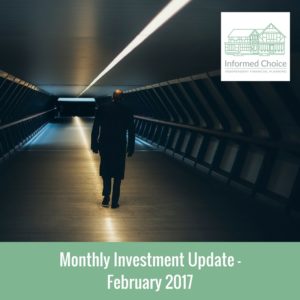 In our latest monthly investment update for February 2017, we look at how the investment markets, global economy and commodity prices are performing.
In our latest monthly investment update for February 2017, we look at how the investment markets, global economy and commodity prices are performing.
The FTSE 100 index of leading UK company shares finished January at 7,099.15 points, falling by 43.68 points or 0.6% during the month.
The index bounced back from its one month low at the start of the month, led by rising commodity stocks after crude oil and some precious metal prices increased.
Stocks in London largely ignored a new factory survey at the start of February, which pointed towards weaker production. Analysts suggested this manufacturing productivity reading had already been priced in by investors.
The survey pointed towards the sharpest rise in factory costs on record during January, likely prompted by falling Sterling since the UK’s Referendum last June.
The Dow Jones Industrial Average reached a new record high in late January, closing above 20,000 points for the first time.
New highs were also recorded for the S&P 500 and Nasdaq indices, all fuelled by hopes that President Donald Trump’s policies will provide a welcome boost the US economy. Investors have piled cash into the US stock market on hopes of corporate tax cuts and higher economic growth.
The so-called ‘fear index’, the CBOE volatility index (VIX), which uses S&P 500 options prices to track the magnitude of the market’s expected moves over the next 30 days, is well below its long-term average.
UK price inflation rose to its highest rate since July 2014 in December, according to the latest official figures published in January. The rise was mainly due to higher air fares and food prices.
The Office for National Statistics said the annual rate of Consumer Prices Index (CPI) measure of price inflation was 1.6% in December, up from 1.2% the previous month. This higher price inflation suggests the fall in Pound Sterling is starting to feed through into the cost of goods and services.
House prices in the UK have risen by their slowest annual rate in more than a year, according to the latest data for January. Analysts suggest this is an early indication of a property market slowdown in 2017.
The Nationwide survey showed annual house price inflation falling from 4.5% in December to 4.3% in January. This was the weakest annual growth recorded since November 2015.
Average house prices rose by 0.2% in January, falling from a 0.8% monthly rise in December. The average price of a home in the UK now stands at £205,240, according to Nationwide.
According to Robert Gardner, Nationwide’s chief executive, there are indications the housing market will soften this year, due to household budgets coming under pressure from higher consumer price inflation at a time of weaker jobs and wage growth.
The Bank of England will decide whether to hold interest rates at their record low of 0.25% when the Monetary Policy Committee meets on 2nd February. Policymakers are expected to keep interest rates on hold, despite rising price inflation and stronger than expected economic growth figures.
Investment markets have priced in a 50% chance of interest rates rising by the end of this year, depending on the progress made with UK negotiations to leave the European Union.
Analysts have raised their oil price forecasts for 2017 as the OPEC supply-cut deal is starting to tighten oil markets. The Reuters poll of 31 economists and analysts, published at the end of January, warned of rising US oil output as a potential balancing factor to the cartel’s deal to cut output.
Analysts are forecasting an average Brent crude futures price of $58.01 a barrel this year, up from $57.43 a barrel in the previous poll. This was the second consecutive Reuters poll where analysts raised their forecasts for Brent crude prices.
The benchmark 10 year UK Gilt yield stands at 1.443% at the start of February, rising during the past month.
£1 buys $1.26290 or €1.17020. The Forex Gold Index is $1,216.80 /oz and the Silver Index is $17.10/oz.

